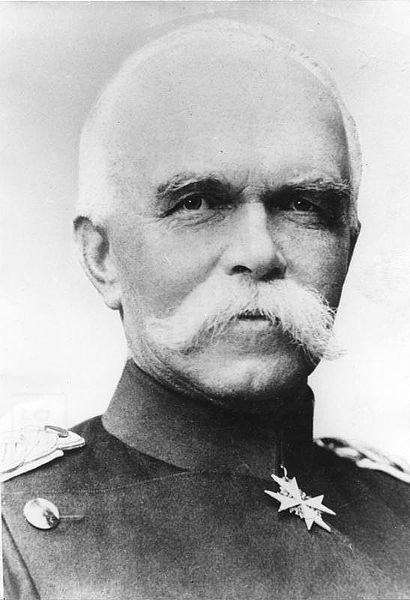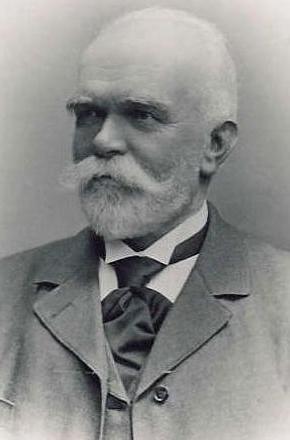<Back to Index>
- Philosopher Giovanni Pico della Mirandola, 1463
- Painter Charles Le Brun, 1619
- 2nd Chancellor of the German Empire Georg Leo Graf von Caprivi de Caprera de Montecuccoli, 1831
PAGE SPONSOR


Georg Leo Graf von Caprivi de Caprera de Montecuccoli (born Georg Leo von Caprivi; 24 February 1831 – 6 February 1899) was a German major general and statesman, who succeeded Otto von Bismarck as Chancellor of Germany. Caprivi served as German Chancellor from March 1890 to October 1894.
He was born in Charlottenburg (today a district of Berlin) the son of jurist Julius Leopold von Caprivi (1797 – 1865), who later became a judge at the Prussian supreme court and member of the Prussian House of Lords. His father's family was of Italian and Slovene origin, their original surname was Kopriva and they originated from Koprivnik (Nesseltal) near Kočevje in the Kočevski Rog (Hornwald) region of Lower Carniola (present-day Slovenia). The Caprivis were ennobled during the 17th century Ottoman – Habsburg wars, they later moved to Landau in Silesia. His mother was Emilie Köpke, daughter of Gustav Köpke, headmaster of the Berlinisches Gymnasium zum Grauen Kloster and teacher of Caprivi's predecessor Otto von Bismarck.
Caprivi entered the Prussian Army in 1849 and served in the Second Schleswig War of 1864, the Austro-Prussian War of 1866 as a major in the staff of Prince Friedrich Karl of Prussia, and the Franco-Prussian War of 1870/71, the latter as a corps Chief of Staff. Backed by the Cief of the general staff Helmuth von Moltke, Caprivi achieved the rank of Lieutenant Colonel and distinguished himself at the Battle of Mars-la-Tour, the Siege of Metz and the Battle of Beaune-la-Rolande, receiving the military order Pour le Mérite.
After the war he served at the Prussian War Ministry and in 1883 succeeded Albrecht von Stosch - a fierce opponent of Chancellor Bismarck - as Chief of the Imperial Navy, a position in which he showed significant administrative talent. Caprivi's dissents with the naval policy of Emperor Wilhelm II led to his resignation in 1888. He was briefly appointed to the command of the X Army Corps stationed in Hanover,
before being summoned to Berlin by Emperor Wilhelm II in February 1890.
Caprivi was informed that he was the Kaiser's intended choice should
Bismarck prove resistant to Wilhelm's proposed changes to the
government, and upon Bismarck's dismissal on March 18, Caprivi became Chancellor. Caprivi's administration was marked by what is known to historians as the Neuer Kurs ("New Course") in both foreign and domestic policy, with moves towards conciliation of the Social Democrats on the domestic front, and towards a pro-British foreign policy, exemplified by the Anglo-German Agreement of July 1890, in which the British ceded the island of Heligoland to Germany in exchange for control of Zanzibar. This led to animosity from the colonialist pressure groups like the Alldeutscher Verband, while Caprivi's free trading policies led to opposition from
conservative agrarian protectionists. The treaty also gave Germany the Caprivi Strip, which was added to German South West Africa, thus linking that territory with the Zambezi River,
which he had hoped to use for trade and communications with eastern
Africa (the river proved to be unnavigable). He opposed the ideas of a preventive war against Russia developed by General Alfred von Waldersee, nevertheless he conformed to the decision of Emperor Wilhelm and the like-minded officials of the Foreign Office around Friedrich von Holstein not to renew the Reinsurance Treaty, whereafter Russia forged the Alliance with France. The rejection by the Conservatives itensified, accompanied with constant public attacks by retired Bismarck. Caprivi also lost the support of the National Liberals and Progressives in
a legislative defeat of 1892 on an educational bill providing
denominational board schools, a failed attempt to re-integrate the
Catholic Centre Party after the Kulturkampf. Caprivi had to resign as Prussian Minister President and was replaced by Count Botho zu Eulenburg,
leading to an untenable division of powers between the Chancellor and
the Prussian premier, ultimately leading to the dismissal of both in
1894 and their succession by Prince Chlodwig von Hohenlohe-Schillingsfürst.